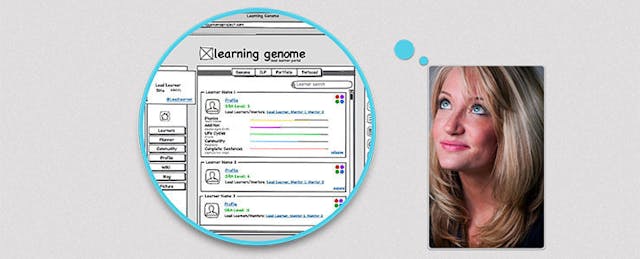“What is education’s biggest challenge? After ten years in education, I’ve learned that the classroom really has begun to strip away the humanity of children...by finding one-size-fits-all curriculum, by making the classroom look more like a factory than reflecting those it serves.”--Kelly Tenkely, teacherpreneur
It may sound like a quote pulled straight from Sir Ken Robinson’s viral TEDTalk on schools killing creativity (still #1 on the TED charts as of last month). But among the themes bubbling up through the education ecosystem, one is getting echoed by diverse and largely unallied people: namely, personalized education.
That’s also about where the kumbaya moment ends. Exactly how to craft “personal” or “personalized” learning and what technology tools should support that is a vigorously debated--and potentially big dollar--question.
The Department of Education is devoting serious money and brainpower to personalization. This year’s Race To The Top competition, for instance, states that creating “personalized learning environments” is “absolute priority 1” for those applying for $400 million in funding. The Department is also working with non-profits and companies to see how Big Data can help. Among its various projects are the Learning Registry and Learning Resource Metadata Initiative, both of which aim to make online learning tools more easily discoverable through an elaborate system of tags and taxonomy.
But it’s not just government entities and companies driving the push for personalization. Around the country, enterprising teachers are organizing, sharing, and creating tools of their own. And most recently, one educator has taken it upon herself to make personalized learning a reality.
On Sept. 19, Colorado-teacher-turned entrepreneur Kelly Tenkely launched an IndieGoGo campaign to raise $85,000 for the Learning Genome Project, a proposed online platform where educators can share and tag learning resources and get recommendations on which ones best fit the needs of their students. (No relation to an older University of Phoenix project by the same name.)
Entrepreneurialism is, well, in her genes. Tenkely says she hails from a family that has lived by the motto: “If you know what you want and it doesn’t exist, go build it yourself.” She began in 2003 as a second grade teacher in Colorado and later became a tech specialist, helping schools add digital materials to their curriculum and teaching computer literacy to students. In 2011, she, along with a fellow teacher, even founded a private school, the Anastasis Academy, a K-8 school where every student is equipped with an iPad and Evernote ePortfolio.
It was during a routine Twitter exchange on #edchat session in the fall of 2010 that Tenkely had an epiphany, one that set her on the path to the Learning Genome Project. “I was listening to Pandora, and this great song came on that I never heard before. How great is it that we can have these customized channels of songs I love that I’ve never heard before?”
So she tweeted: “What if curriculum looked more like Pandora?” The overwhelming positive led her to begin drafting out ideas and Balsamiq wireframes to create a campaign via IndieGoGo to turn her vision a reality.
The Learning Genome Project has two core components. The online platform will first assess students’ learning preferences, strengths and weaknesses. Then it will create customized learning maps for students and recommend the learning resources that best fit their needs, based on a system of tags and algorithms.
For Tenkely, one of the biggest takeaways from her work as and with educators has been that “If you don’t know what you’re looking for, you don’t know to search for it. The discovery process has to happen more like Pandora, where new ideas and resources come to you.” She believes her approach will have an edge over the likes of the Learning Registry and the Learning Resource Metadata Initiative. Those projects she says “presume that you know what you are looking for...but don’t START with the learner as the center of the engine. They begin with the curriculum.”
And she can’t stress enough the need to design around the needs of educators, noting that the Learning Registry “isn’t an average UI for the average teacher...Most teachers won’t have the time or motivation to contribute to it because it is entirely too ‘techy’.”
Figuring out how to build a personalized engine has been an ongoing challenge for companies. Tenkely’s not the first to make references to Pandora in the pursuit of an personalized platform for learning resources. eSpark Learning, a startup from Chicago, IL, describes itself as a “Pandora for elementary school students” that provides personalized iPad app recommendations based on a system of tags and curated reviews. Recent Y Combinator graduate, Knowmia, is building an engine inspired by Pandora’s Music Genome Project to make personalized recommendations for educational videos. And then there’s Knewton, which over the years has received considerable funding and media attention for its trademarked adaptive learning platform.
That competition isn’t deterring Tenkely. A firm believer in the power of crowdsourcing, she is confident that her peers, cultivated via online networks, will lend a virtual hand, from pledging funding to sharing and tagging materials. (She currently has over 11,000 followers on Twitter.) She sees in Twitter and Wikipedia inspiration that “educators will walk a million miles to help and share resources with someone they’ve never met.”
Tenkely's campaign still has a steep path before she reaches her funding watermark. But if she falls short, she remains steadfastly committed to dedicate whatever she's raised to the project. Even with funding, creating the system she describes faces daunting technical challenges. But Tenkely's energy and determination to apply the latest technology tools to learning signals a deep willingness among a growing number of educators to explore options.
“I think that this will completely change actual teaching practices when everything comes together,” asserts Tenkely.


